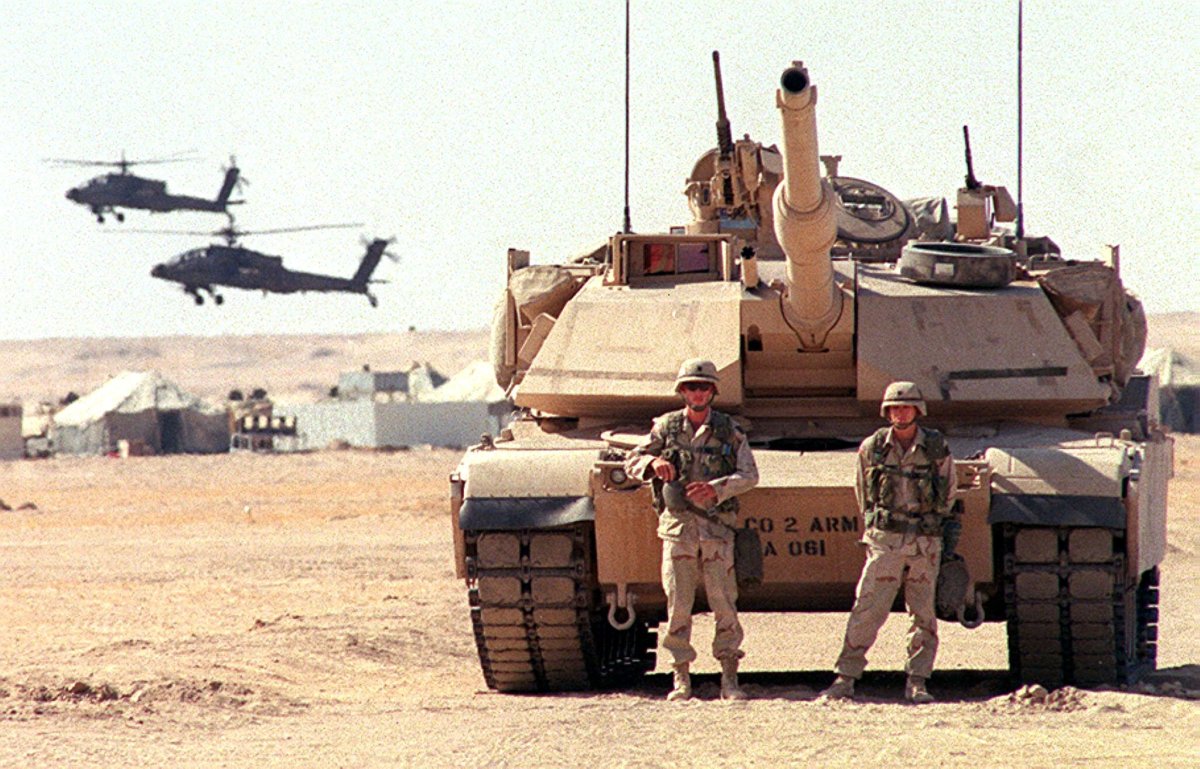As tributes to former president George H.W. Bush roll in from around the globe, his Middle Eastern legacy looms large.
Bush was the president that began America's direct, large-scale involvement in the region, sending U.S. troops to push Saddam Hussein's forces back from their invasion of Kuwait in what became the 1991 Gulf War.
The 100-hour war was a stunning demonstration of U.S. military might, as American troops—alongside their international partners—smashed the Iraqi army, considered at the time one of the strongest forces in the Middle East.
Iraqi forces crossed into Kuwait on August 2, 1990. Hussein claimed that the tiny country had cost him $14 billion by ignoring OPEC (Organization of the Petroleum Exporting Countries) quotas, the Associated Press noted. He also accused Kuwait of pumping crude oil from a disputed oil field, costing Iraq a further $2.4 billion.
On top of these grievances, Hussein demanded Kuwait write off around $15 billion in Iraqi debt accrued during the country's long and bloody war with neighboring Iran.
Bush rallied a 30-nation coalition to liberate Kuwait, warning Hussein, "This will not stand, this aggression against Kuwait."
In February 1991, U.S.-led forces swept into Kuwait and Iraq. Just 148 Americans died during the campaign, compared with an estimated 20,000 Iraqis. Driven out of Kuwait, the Iraqi army fled back into home territory, where Bush did not pursue them.

Though some argued for an expansion of the war into Iraq, Bush decided not to topple Hussein. "To occupy Iraq would shatter our coalition, turning the whole Arab world against us, and make a broken tyrant into a latter-day Arab hero," Bush later said.
"It would have taken us way beyond the imprimatur of international law... assigning young soldiers to a fruitless hunt for a securely entrenched dictator and condemning them to fight in what would be an unwinnable urban guerrilla war."
These prescient words would come to haunt his son, George W. Bush, who led the U.S. into two long and bloody wars in Iraq and Afghanistan in the aftermath of 9/11—wars that continue to this day. Indeed, Bush senior was set against the U.S. becoming "an occupying power in a bitterly hostile land," though The Guardian noted he was always supportive of his son's foray into Iraq, at least in public.
But his decision not to continue the war had dire consequences for Hussein's domestic opponents. Shiite and Kurdish insurgents responded to Bush's call to rise up against the dictator as his troops fled Kuwait, but thousands were massacred as they stood alone against the dictator.
"I feel tension in the stomach and in the neck ... but I also feel a certain calmness when we talk about these matters," Bush said of the 1991 Gulf War, according to biographer Jon Meacham. "I know I am doing the right thing."
Despite his refusal to expand the Gulf War, Bush oversaw the creation of a network of American bases in the Middle East, establishing a significant regional U.S. footprint.
Indeed, U.S. bases in Saudi Arabia were a key grievance of the Al-Qaeda terror group, which launched an era-defining attack on America in 2001. The response to 9/11 would see hundreds of thousands of American and coalition troops deployed to the Middle East in the War on Terror, embroiling the U.S. in decades of conflict with no end in sight.
Uncommon Knowledge
Newsweek is committed to challenging conventional wisdom and finding connections in the search for common ground.
Newsweek is committed to challenging conventional wisdom and finding connections in the search for common ground.
About the writer
David Brennan is Newsweek's Diplomatic Correspondent covering world politics and conflicts from London with a focus on NATO, the European ... Read more
To read how Newsweek uses AI as a newsroom tool, Click here.








